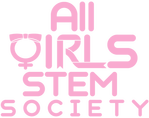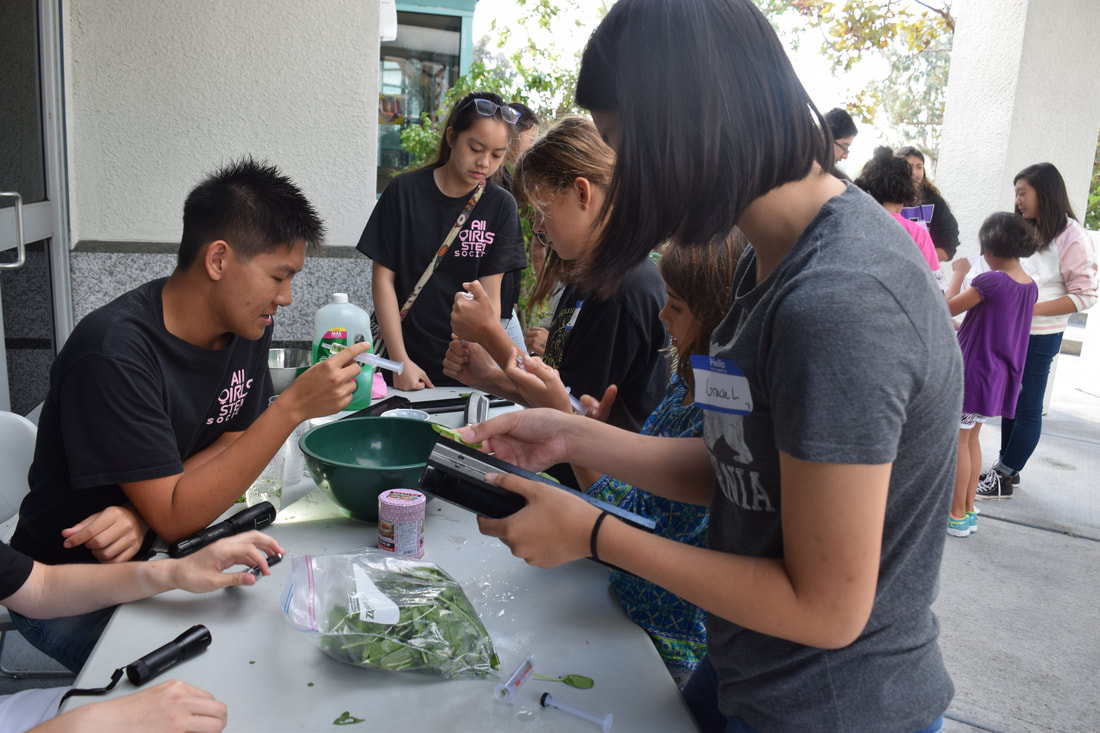By Danica Chen, Del Norte High SchoolOn September 17, 2017, the All Girls STEM Society held its first Biology workshop, during which girls learned about the fundamental components of life through informative demonstrations and hands-on experiments. "I like learning about biology, it's nice," Maleihny L. says, a few minutes before the workshop begins. A video showing the inner workings and parts of a cell plays as the team wraps up their preparations and the participants start to show up. The room began to fill with young girls, some veterans of the AGSS organization and some new members, some just starting fourth grade and some about to leave middle school, but all interested in biology.
"We don't talk a lot about biology in school, but I do really like it," Bhadra R. tells me. She is a long-time member of AGSS, attending workshops since 2015. The workshop opened with a quick presentation about Rosalind Franklin, the X-ray crystallographer that helped identify the double-helix structure of DNA. In her time, due to the sexist scientific environment, she was largely belittled by her peers and uncredited for her discovery. Today, such sexism is not entirely gone, as shown by the growing but unequal percentage of women in STEM jobs. The presentation gave a quick overview of Franklin's work and concluded with the first round of trivia for which the girls could earn prizes, such as notebooks or pencils. Afterwards, Sahil Malhotra and William Tian presented biology basics, going over the different branches of biology, the definition of life, and essential knowledge of cells and DNA. Information was interspersed with trivia questions and laughter from the girls. This presentation also finished with a trivia section, awarding prizes to those girls who could get the questions right - as well as raise their hand fast enough to beat the rest of the room. Following the second presentation there was a ten minute break so the girls could relax and eat snacks. Cookies, bananas, and water were provided by the organization. During this time, the girls talked, joked, and played games. Once the break ended, the activities began. There were three activities that the girls rotated through: labeling flowers, observing photosynthesis through spinach leaves, and finding strawberry DNA. In the library room, the girls competed to see who could label the parts of a flower correctly the fastest; after they did so accurately they complete a biology-related crossword. The competition to finish first was heated, but all in good fun. Outside there were two tables: one for photosynthesis and one for DNA. At the photosynthesis table, the girls punched holes in spinach leaves and put the resulting pieces into a syringe full of water, Once they expunged all the air and got the leaves to sink to the bottom, they put the spinach into a cup of water and watched photosynthesis at work. By shining a bright flashlight on the spinach, the pieces floated back to the top. As the plants undergo photosynthesis and release oxygen, they again begin to float. At the other table, the girls learned to isolate strawberry DNA. They mixed salt, water, and dish soap into a solution and poured it into a Ziploc bag. Then they crushed a strawberry inside of it until all chunks of the strawberry were gone and the mixture turned a bright red. Floating on the top on the liquid was a cloudy strand of DNA. Although the experiment process got messy at times, there was no doubt that they were a success. Every participant was eager to learn, and each volunteer on hand was happy to explain. Watching the girls excitedly perform the experiments or observe the end results in fascination, it was evident that their education came hand in hand with a positive experience. Once the girls had cycled through every station, the workshop came to an end. Makayla V. said even though she does not like learning science at school, she enjoyed the workshop. "I liked it and I think I learned a lot," she said as the girls started saying their goodbyes and leaving. There was no doubt that she would come again to learn more at the next event. The next workshop will be a Chemistry Workshop at North University Community Branch Library on October 15th. See Dates and Events for more details.
0 Comments
Leave a Reply. |
Archives
June 2024
|
All Girls STEM Society is a 501(c)(3) nonprofit organization.

